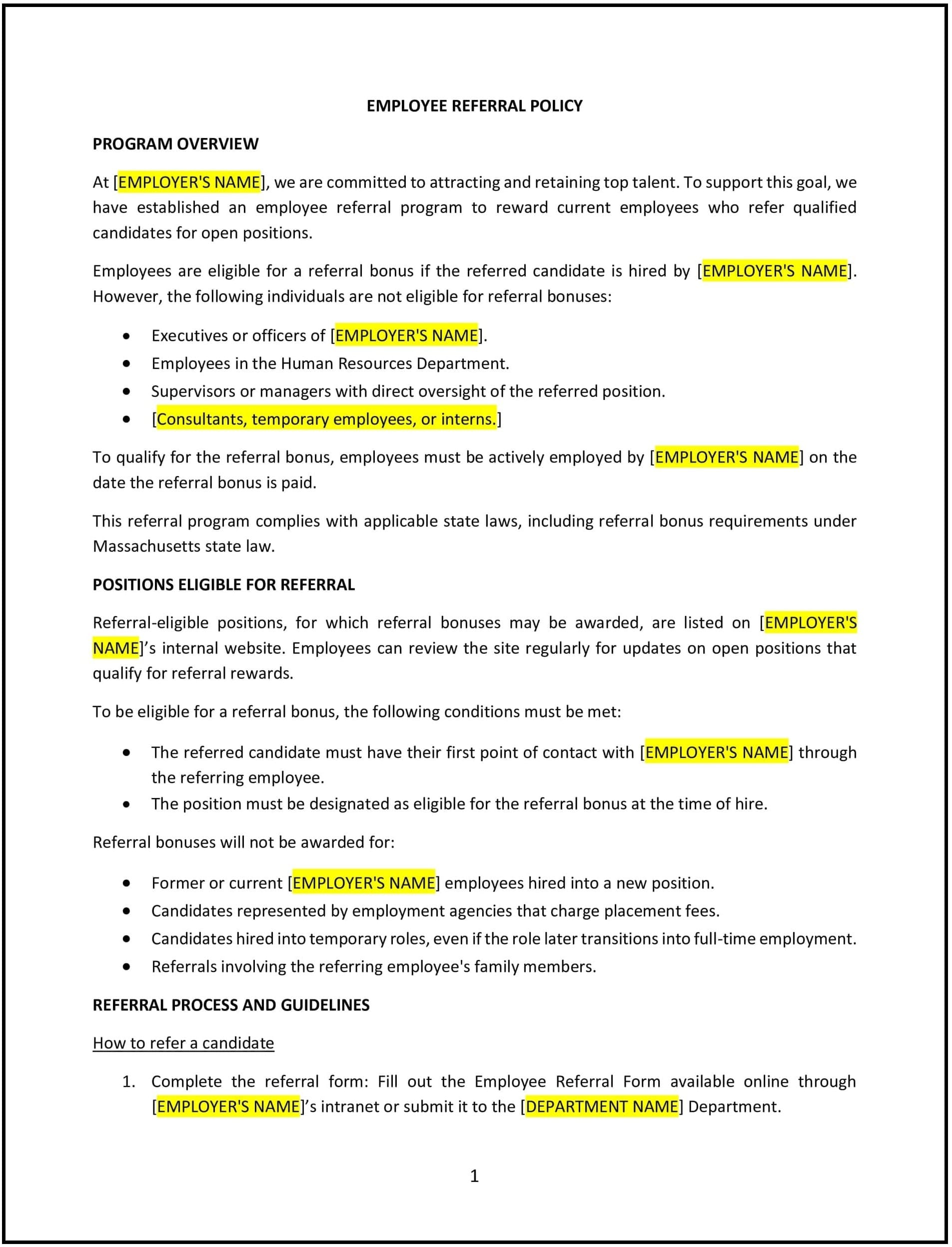Employee referral policy (Massachusetts): Free template
Got contracts to review? While you're here for policies, let Cobrief make contract review effortless—start your free review now.

Customize this template for free
This employee referral policy is designed to help Massachusetts businesses establish guidelines for rewarding employees who refer qualified candidates for open positions within the company. The policy outlines the eligibility requirements for employees to participate in the referral program, the types of roles eligible for referrals, and the rewards or incentives employees can receive for successful referrals. It also clarifies how the referral process works and how the company will evaluate referred candidates.
By adopting this policy, businesses can leverage their existing employees’ networks to attract top talent, improve recruitment efforts, and strengthen company culture.
How to use this employee referral policy (Massachusetts)
- Define eligibility: Specify which employees are eligible to participate in the referral program. This may include full-time employees, part-time employees, or employees in certain departments. The policy should outline any exclusions, such as employees involved in hiring decisions or employees on probation.
- Outline referral process: Clearly explain the steps employees need to take to refer candidates, including how to submit a referral (e.g., via an online form, email, or referral platform) and any necessary documentation.
- Identify eligible positions: Define which job positions are eligible for the referral program, such as full-time, part-time, or temporary roles. The policy should specify whether certain high-priority or hard-to-fill positions are given special consideration.
- Specify rewards and incentives: Outline the rewards or incentives employees can receive for successful referrals, such as monetary bonuses, gift cards, extra paid time off, or other recognition. The policy should clarify when and how the reward will be given (e.g., after the referred candidate is hired, after a probationary period).
- Address unsuccessful referrals: Clarify that employees will not receive a reward for referrals that do not result in a successful hire. The policy should also address situations where the referred candidate does not complete the probationary period or leaves the company soon after being hired.
- Ensure fairness and transparency: Establish guidelines to ensure that the referral process is fair and transparent. This may include how referrals are reviewed, who is responsible for making the final hiring decision, and how employees will be notified of the outcome of their referral.
- Comply with Massachusetts and federal laws: Ensure that the referral policy complies with Massachusetts state laws, including anti-discrimination laws, and federal regulations regarding fair hiring practices. The policy should make it clear that all applicants will be evaluated on their qualifications and suitability for the role without bias.
- Review and update regularly: Periodically review and update the referral policy to ensure it aligns with the company’s changing hiring needs, industry trends, and legal requirements.
Benefits of using this employee referral policy (Massachusetts)
This policy offers several benefits for Massachusetts businesses:
- Attracts top talent: By incentivizing employees to refer qualified candidates, the business can attract high-quality talent, often from within the employees' own networks.
- Reduces recruitment costs: Employee referrals are typically more cost-effective than external recruitment efforts, as the company can reduce the need for expensive job postings, external recruiters, and advertising.
- Improves employee engagement: Offering rewards for successful referrals demonstrates that the company values employee contributions to the hiring process, which can increase engagement and morale.
- Strengthens company culture: Employees are more likely to refer candidates who align with the company’s values and culture, resulting in hires that are a better cultural fit and more likely to succeed in the workplace.
- Speeds up the hiring process: Referral candidates are often pre-screened and vetted by existing employees, which can accelerate the recruitment process and reduce time-to-hire.
- Increases retention: Since referred employees often have a better understanding of the company culture, they may be more likely to stay with the company long term, improving employee retention rates.
Tips for using this employee referral policy (Massachusetts)
- Communicate the program clearly: Ensure all employees are aware of the referral program and its benefits by regularly communicating the policy through email, employee handbooks, or internal meetings.
- Promote the program regularly: Periodically remind employees about the referral program, especially when new job openings are available. Use email, company newsletters, or intranet posts to promote the program and encourage participation.
- Ensure a fair evaluation process: Make sure all referred candidates are evaluated fairly based on their qualifications and the job requirements. Ensure that the referral process is transparent and unbiased to prevent any perceptions of favoritism.
- Track referral success: Keep track of employee referrals and the success rate of those candidates in terms of hiring and retention. This can help identify areas of improvement for the referral program and measure its effectiveness.
- Recognize and reward referrers: Acknowledge employees who participate in the referral program and reward them promptly for successful referrals. This can increase employee motivation to engage in the program.
- Review and update regularly: Periodically review the referral policy to ensure it remains relevant to the company’s goals, complies with current Massachusetts state laws, and reflects any changes in hiring practices.